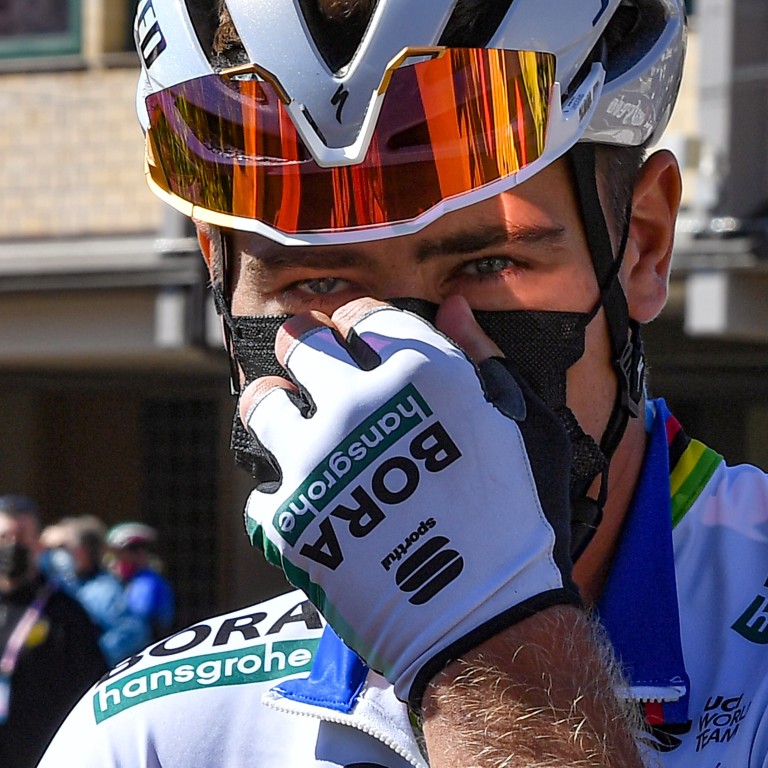
Pro-cycling survives 12 months of Covid-19 restrictions, now ‘defiant’ as vaccines give hope for return to normal
- After a year of races with no or limited crowds, there is now a sense of when, not if, racing will return to normal
- Last year, a year’s worth of events were crammed into three months, making for thrilling races and new faces
Sports fans would never have guessed in March 2020 that events would still be on hold 12 months later.
For pro cyclists the first true Covid-19 blow was dealt at the World Tour ranked UAE Tour stage race in March, when the entire race was halted and forcibly quarantined, much to the protests of riders and staff. It did seem slightly absurd back then.
As the virus raced through Europe many bike races found themselves being halted mid-flow until they were all finally put into the same lockdown.
Against all odds and maybe even strings of wisdom the whole show resumed in August. One whole year’s worth of prime races were crammed into a three-month slot that was shrouded in uncertainty.

Strangely enough that uncertainty as to whether a race would reach the end made for some of the best racing in years.
Months of enforced indoor training and need for riders to prove their worth to keep their jobs resulted in a huge power shift within the often jaded and regimented ranks of pro bike racing. New and younger riders took the lead, riders who had seemingly fared better with the virtual world of training.
What the return of World Tour cycling tells us about the new normal
But lockdowns and more informed restrictions were once again put into place by the end of summer.
By then team and race bubbles had become the new normal, and as winter came many teams headed south in their mobile bubbles for training camps. Most were held in Spain, which its self was under strict restrictions. Even so, the bike business in general (but certainly not all) had boomed during the pandemic, and thus there was, and still is an air of confidence abounding within the sport.
As 2021 dawned the first batch of early season races fell by the wayside. Many of these events were in Australia, Malaysia, Argentina and other non-European locations, places that would require long haul air travel for teams.

During the winter the predominantly Belgian led cyclo cross scene had scraped through the chilled mud of restrictions with many of the key events still happening, all be it in empty Flandrian fields. This was a huge blow to organisations, who rely largely on ticket sales, but it still happened. Dutch star Mathieu van der Poel was once again crowned as World Champion, with presentations of the medal and champions jersey being done before the podium ceremony – as per new protocol, which was a bizarre scenario to witness.
At the end of February, came the UAE Tour, the first World Tour stage race of the season. In the preceding weeks the UAE Team Emirates squad held their training camp in the country, and were the first pro cycling team to be fully vaccinated against the virus.
For many riders this reaching race would also be their first time on a flight in a year. Many would also remember how things panned out there in 2020. The opening stage was won by the Flying Dutchman van der Poel, and then a staff member of his Alpecin-Fenix team tested positive for the virus. The entire team (apart from those directly impacted) were sent home, and once again uncertainty fell over the 2021 season.
Meanwhile in Tenerife (which has been relatively light on Covid infections) many of the major teams and riders were preparing at altitude of the slopes of Mount Teide, much as they do every year.
All seemed well, until multiple former World Champion Peter Sagan and his Bora-Hansgrohe teammates got the results of their PCR test before flying home. Three of them were positive, which forced them into local quarantine and out of the opening spring classics.
Just a few days later and the Italian gravel road based Strade Bianchi classic in Sienna came around, a race that was culled at the eleventh hour in 2020 and then opened the new normal season in August. The Tuscan region around Sienna is still under heavy restrictions due to a rise in infections. It currently carries “red zone” status, meaning that although there were some masked fans at the roadside once the normally crowded streets of the historical centre of Sienna were reached there were no cheering fans. Once again Mathieu van der Poel climbed alone to victory.
Paris-Nice stage race played out to restricted crowds last week with no Covid-19 issues.
The infection rates have so far been considerably higher than in early 2020. Somehow tensions seem to now be tempered by the new-found knowledge we have of the virus, and come sprinkled in the hope provided by the vaccine roll out. There is also the knowledge that the show was eventually pulled off in 2020.
In Asia there is little sign of borders opening just yet, and most races have either been cancelled, postponed, or find themselves raced only by a local peloton.
It’s hard to guess as to just how 2021 will roll out for competitive cycling, although there does seem to be a definite sense of defiance. Talk now turns to when rather than if.
